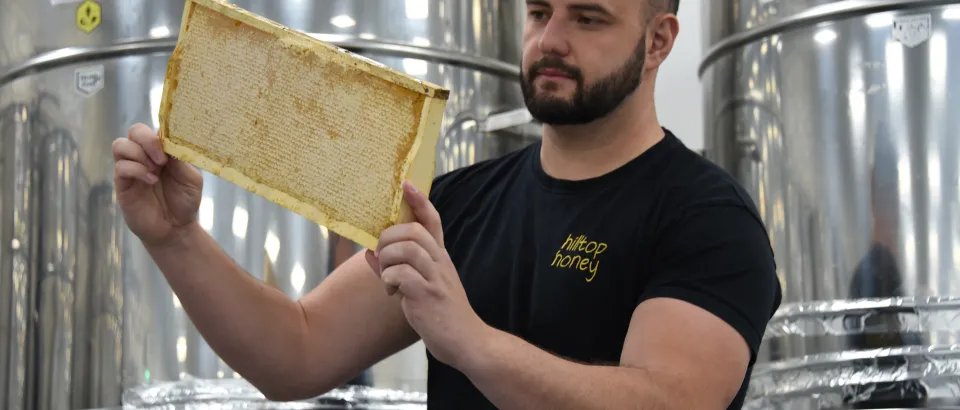
Hilltop Honey is an award-winning, established brand of pure and natural, premium quality honey, available in recyclable hexagonal jars and easy squeezy bottles – a business based in the heart of Wales, delivering and innovating to the honey sector, providing a natural, healthier alternative to refined sugars with the overall mission to help food consumers learn that ‘there’s more to honey’.
Hilltop Honey’s diverse range of honey products are all made of pure and natural honey, with nothing added and nothing taken away. Each individual product is unique in its own way – from the colour right down to aroma notes and flavour. The business was started after Owner & Founder Scott Davies discovered his passion for beekeeping as a means of therapy following a severe back injury which left him unable to continue his previous laborious nature of work. During this time, he was fascinated by the nature of the bees and all they do to create this delicious golden nectar. After researching the ever-expanding market, he decided to create his own brand, but with a younger image and of the utmost quality. Founded in 2011, Scott began creating the buzz of Hilltop Honey.
Hilltop Honey’s products are now available in the UK’s leading supermarkets, farm shops and delis.
What challenges and potential issues were you facing due to the Brexit uncertainty?
To cope with demand, Hilltop Honey imports approximately 95% of its raw materials. The company is highly dependent on the stability of gross margins on raw materials. These margins not only sustain the business, but also determine what contracts the company can tender for and re-negotiate.
Because of its exposure to imports, Hilltop Honey is facing the following risks posed by Brexit:
1. Possible changes to duties and tariffs.
2. Possible exchange rate variations.
3. Possible customs delays.
4. Possible decline in consumer confidence.
Any combination of the above would have a direct impact on the company’s gross margins, and its ability to operate sustainably. In order to absorb varying input costs, Hilltop Honey would possibly need to reduce its number of production staff, which currently stands at 13 employees. Its ability to compete against much larger competitors would also be impacted by higher input costs.
Your reasons for applying for the Brexit Resilience Grant: what projects is this going to be invested towards and how do you think the fund would help you tackle the challenges posed by Brexit?
The Brexit Resilience Grant will enable us to receive specialist technical support relating to the importation of Honey from Europe, which will mitigate customs delays as well as enable us to source raw materials cheaper. It will also enable us to produce a better quality of product thus safeguarding against any decline in consumer confidence.
Any feedback you might have on your engagement with the Business Wales service and the support you’ve received
"Once I decided to pursue setting up Hilltop Honey as a business, I quickly realised I needed help. I was initially concerned about setting up a business as I wasn’t the most academic in school. What I found with Business Wales was they were always on hand to provide help and advice. Be that through Rowan or through the quality courses available, they really help to develop essential key skills and encourage you to think outside of the box.
"The results that I got speak for themselves: Hilltop Honey now has the capabilities to produce 850,000 jars a month. I would recommend Business Wales to anyone looking to set up their own business and looking to turn it into a success." – Scott Davies, Managing Director & Founder of Hilltop Honey.
What other activities are you undertaking to prepare your business for the UK leaving the EU?
Hilltop Honey has embarked on a program of forward reserving foreign currency to mitigate the effects of any possible further decline in the value of Sterling.
Business Wales involvement
Business Wales, through Relationship Manager Rowan Jones, has supported Hilltop Honey from start-up to the growing business it is now: “We reviewed the potential impact of Brexit on the business and looked at production capacity and bottle necks within the process. This highlighted the need for specialist expertise, related to both the importation of honey from Europe and the need for increased production efficiency and capacity. I assisted Scott and the team with their business planning and financial forecasting to underpin the investment decision and finance application process, resulting in a successful Brexit Resilience Grant award.”
